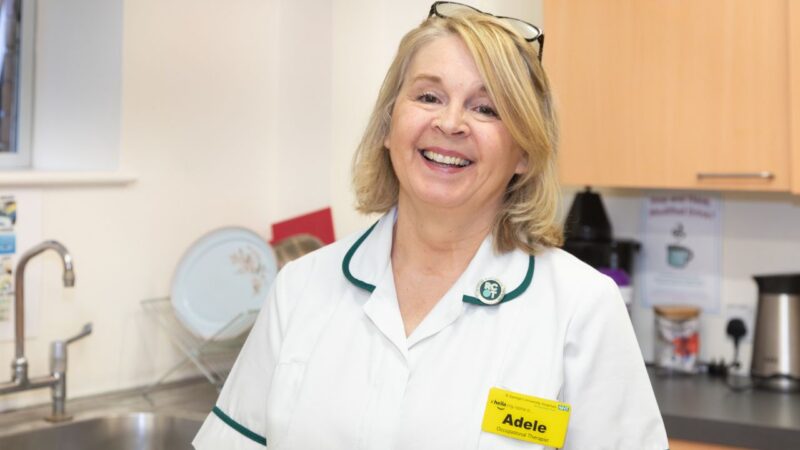Adele Gilbert is an occupational therapist on the Mary Seacole Ward at Queen Mary’s Hospital, Roehampton – part of St George’s University Hospitals NHS Foundation Trust – where she helps older people recover from illness or injury so they can return home.
When not at work she relaxes with her family and menagerie of animals including a flock of chickens named after her hospital colleagues.
This interview is part of a series, going behind the scenes to get to know the people who keep NHS services working – in winter and beyond.
Tell us more about your role?
I am based on a rehabilitation ward, but I also go out to see patients in their home environment. Occupational therapy helps people live their best life at home. We focus on the hopes and aspirations of each person, which could be as simple as doing the dishes or being able to take a shower. We recommend adjustments by looking at the activities they do every day and the challenges. These adjustments are practical, but they can be life changing.
What’s a typical day like?
We start with a handover, therapist to therapist, which really helps us learn about each individual patient. New patients have an assessment with our whole team to plan treatment and set recovery goals. We often do joint assessments with physiotherapy colleagues, which prevents discharge delays by streamlining the process.
As we plan for discharge, we may visit a patient’s home. We talk to relatives and look at whether the home needs to be modified. This helps make the patient more confident, knowing we have organised all the equipment they need such as walking frames or grab rails. We visit them again at home after they have been discharged.
What made you decide to work in the NHS?
I have had a 20-year career in the NHS, but my working life started in catering. I had my own vegetarian restaurant. One day I saw someone sit for five hours in the restaurant because they were lonely. It prompted my career change – I felt I wanted to do more to help. Thankfully someone saw potential in me.
My first job was a physiotherapy assistant. I loved – it was amazing. After getting married I moved to London and did a part-time occupational therapy course at Brunel University and had two children, while I was training, sometimes taking them to lectures with me. I qualified and went on to work at Kingston and St George’s hospitals.
When I saw this new role at the Mary Seacole Ward in Roehampton I applied and have been here for 10 years.
Is there a story of caring for someone you remember?
There is one patient I will always remember who had many health problems and used to come into the ward frequently. June (not her real name) was always determined to get back home as soon as possible. She had no family, but we got to know her and her carers well. We saw her going through the ageing process, but she coped with a strength of character. She was often feisty, sometimes challenging what we suggested.
June had frequent falls, but we worked with the carers to bring in equipment to make life easier for her at home, so she could remain independent. We arranged for a hospital bed to be brought to her home with a pressure relieving mattress so she could get back to her familiar surroundings. When she died, during Covid, I went to her funeral. I will never forget June.
How does your role help the NHS manage winter pressures?
When every patient comes to the ward, we look at how rehabilitation can help them recover and return home. By working closely with community services, we ensure people can be discharged when they are ready with the right support at home. This can free up beds for new patients.
Tell us something that not many people know about you?
I have lots of pets – a python, geckos, two labradors, a cat, two gerbils and 14 chickens and three cockerels. Each of my chickens is named after one of my colleagues. I have a busy life outside of work with my family and animals, which helps counteract the pressures of the job. I like scuba diving and horse riding – my daughter is a marine biologist and my husband, a ranger on Wimbledon Common, rides a horse every day.
What would you be doing now if you hadn’t chosen the NHS?
I would probably still be in catering but may have opened a bed and breakfast or bought a catering van to travel round festivals. But I really cannot imagine working anywhere but the NHS now.
